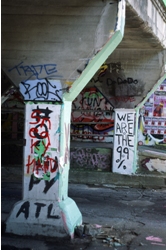Media Tour of Activities Organized at Homeless Shelter
The presence of Occupy Atlanta in the Midtown homeless shelter managed by the Metro Atlanta Task Force was one of the primary reasons cited by Judge Schwall to order the eviction of the Task Force. United Way is expected to take over operations and deliver services to no more than 26 people while the Task Force is currently helping 600 people at the Pine and Peachtree shelter, in Midtown Atlanta. For the business community and some members of the City Council, 26 homeless are easier to sweep under the carpet than a few hundreds. In a society that is still unable to have a frank conversation about what to do with the very poor, it is not unusual to see the problem disappear from public’s eyes through political and legal maneuvers.
To show what political activism can accomplish for the very poor and the community in general, Occupy Atlanta invited the media at the Pine and Peachtree shelter for a tour of the activities produced through the organic affiliation of the Task Force and movements for change such as Occupy Atlanta. Members of the media could see a rooftop garden, an art gallery, and a very busy bike shop where parts are collected to build bicycles. The tour was also an opportunity to ask questions to the Task Force, seen by the general public as deserving eviction because of its unpaid bills. Jennifer Leslie from 11News and her talented cameraman; Richard Van Slyke from RoamingVideo.com; and I were there to cover the story.
The story of unpaid bills started in 2001 when the Task Force qualified for a HUD grant with matching grants from the City of Atlanta and the State of Georgia. The $900,000 that were expected from the City and the State were never disbursed. Debbie Starnes from the City Council and the Atlanta Center for Progress led an effort to attach new conditions that were in contradiction to the Task Force’s mission and HUD guidelines on gender discrimination. To receive the matching grants, the Task Force was required to deliver its services to women and children only, a much more acceptable presence for the Midtown business community. Mercy Housing from the Sisters of Mercy eventually came to the rescue and acquired the commercial notes issued for the mortgage loan. According to Dr. Richard Steffen and Carl Hartrampf, from the Task Force’s board of directors, their alliance with Mercy Housing was very fruitful and plans were underway for renovations and the creation of affordable housing but in 2006, their Midtown presence clashed again with the City Council and the business community. This time, through shell organisations recently created to look like charities and to exert influence on the Sisters of Mercy Ministries, the Atlanta Center for Progress with friends in City Council were able to have the notes sold to Emanuel Fialkow from the Ichthus Community Trust, one of the recently created charities serving the interests of the Midtown business community.
While the Metro Atlanta Task Force for the Homeless is now being accused of being responsible for alienating potential partners, it is fighting alone for its survival with whatever legal recourses available for exposing trickeries engineered towards its failure.
- Charles Steffen, of the Metro Atlanta Task Force for the Homeless
- 11News Crew with Occupy Atlanta Activists
- Jennifer Leslie from 11News speaking with former Atlanta Housing Commissioner Carl Hartrampf
- Former Atlanta Housing Commissioner Carl Hartrampf Giving Tour to 11News Crew
- Richard Van Slyke of RoamingVideo.com and 11News Cameraman on Rooftop of Pine and Peachtree Homeless Center
- Garden bed on Rooftop
- Small Carrot from Rooftop Garden Bed in Mid-February
- 11News Cameraman Filming Bike Repair
- Jennifer Leslie, Carl Hartrampf and Richard Steffen























Pingback: Contact Info Update: Metro Atlanta Task Force for the Homeless: Art Studio for the Homeless « Thinking Outside the Box